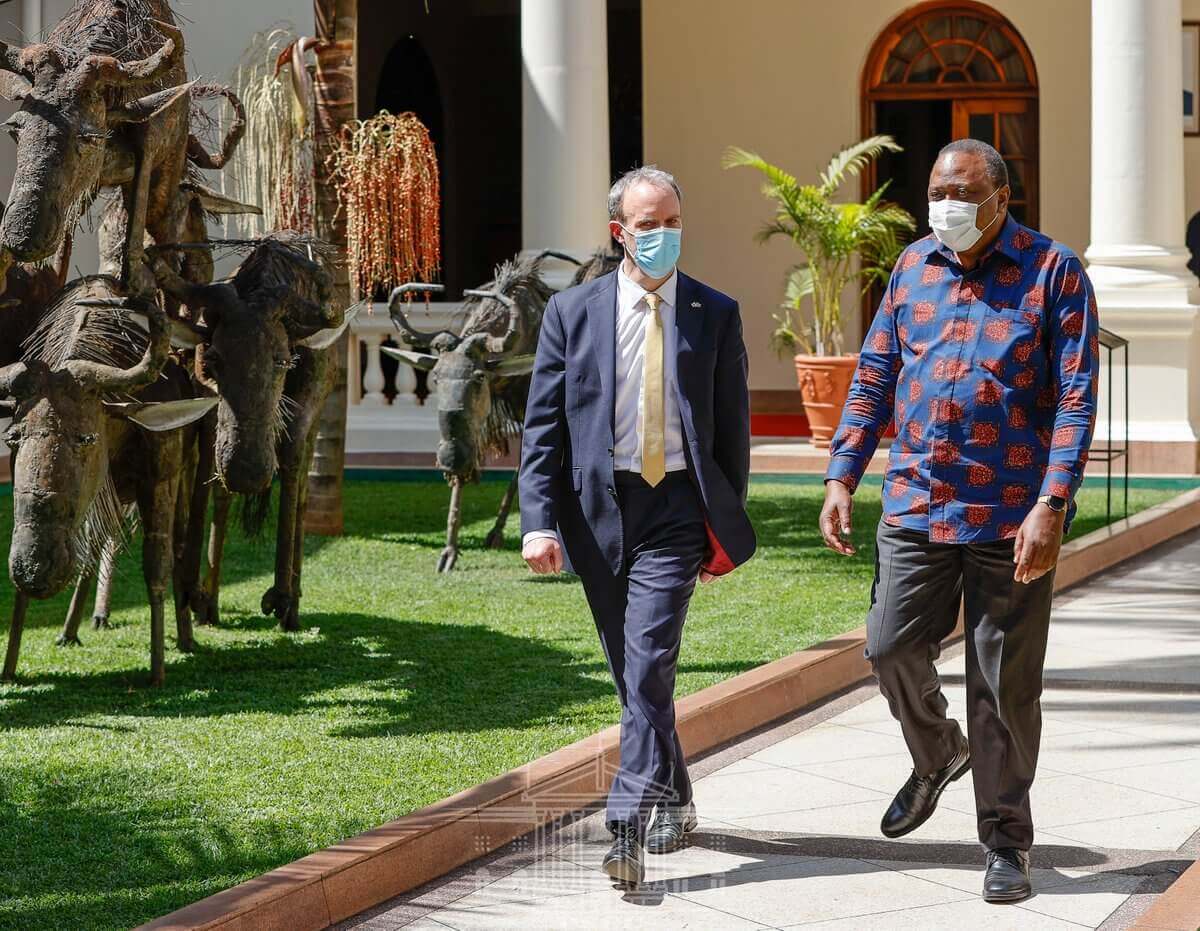Kenyan President Uhuru Kenyatta hosted United Kingdom (UK) Foreign Secretary Dominic Raab and Minister for Africa James Duddridge at the State House in Nairobi on Wednesday, wherein the two sides discussed the recently signed trade deal between the two countries. Cabinet Secretaries Amb Raychelle Omamo (Foreign Affairs), Dr Fred Matiang’i (Interior) Ukur Yatani (National) Treasury), Betty Maina (Trade) and Prof George Magoha (Education) were also in attendance, alongside Head of Public Service Dr Joseph Kinyua, State House Deputy Chief of Staff Ruth Kagia, and Kenyan Ambassador to the UK Manoah Esipisu.
According to a statement put out by the office of the Kenyan president, they “discussed a wide array of subjects key among them the strengthening Kenya-UK commercial ties”. On this front, Kenyatta said that the newly-signed agreement would “create employment for Kenyan youth and improve the country’s economic performance”.
The two British officials also broached the topic of climate change, and Kenyatta said that Kenya was striving to achieve 10% “national tree cover” as part of his conservation initiative, which also includes a movement towards renewable sources of energy.
Minister Duddridge said, “We have gone to great lengths in ensuring we restore and conserve our water towers and we believe this is an area we can closely collaborate for the good of the planet.”
In early December, the UK and UK Trade Minister Ranil Jayawardena and Kenyan Trade Cabinet Secretary Betty Maina met in London to formally sign an agreement prior to the Brexit deadline at the end of 2020.
The agreement will allow Kenyan producers of flowers, coffee, tea, and fresh vegetables to export their goods to the UK without the imposition of duties or quotas, which replicates the arrangement the two countries shared while the UK was still a part of the European Union (EU). The deal could be expanded to include textile, livestock, fish, and other processed goods. The new deal also simplifies the process for Kenya to export processed items that were produced within its borders but whose raw materials were imported from elsewhere. Likewise, UK exporters of vehicles, pharmaceuticals, and paper will benefit from greater access to the Kenyan market.
At present, trade between the two countries stands at $1.8 billion per year, with the UK representing Kenya’s fifth-largest export destination. In fact, 43% of Kenya’s vegetable exports are destined for the UK.
Alongside the UK, Kenya is also seeking to sign a trade agreement with the United States (US), and this process may have been made simpler by President Donald Trump’s exit from the White House. The Trump administration had reportedly asked Kenya to publicly support Israel as one of the pre-conditions for a free trade agreement (FTA). This included “discouraging politically motivated actions to boycott, divest from, and sanction Israel” and the “elimination of politically motivated, non-tariff barriers on Israeli goods, services, or other commerce imposed on Israel; and the elimination of State-sponsored, unsanctioned foreign boycotts of Israel, or compliance with the Arab League Boycott of Israel”.
These requirements, of course, generated unease amongst Kenyan policymakers, given the preconditions resembled coercive tactics by Washington.
The current Africa Growth and Opportunity Act (AGOA) expires in 2025, and both sides are seeking to replace it with a new agreement that guarantees more open access to each other’s markets. In fact, in a meeting with outgoing US Ambassador to Kenya Kyle McCarter on Tuesday, Kenyatta said, “We appreciate what has been achieved through AGOA, but it is time we moved to much more closer trade arrangements that are mutually beneficial. We will not lose focus on concluding the FTA.” Amb McCarter, meanwhile, said that he will continue to seek to increase American investment in Kenya even though his tenure in the country has ended.
Kenyatta’s discussion with Amb McCarter followed closely on the heels of his meeting with Japanese Foreign Affairs Minister Toshimitsu Motegi on 13 January, during which the Japanese official expressed his country’s “commitment to supporting Kenya’s development programs especially key infrastructure projects” such as the “expansion of Mombasa Port and the development of the Dongo Kundu Special Economic Zone (SEZ)”.
Motegi also met with Cabinet Secretary for Foreign Affairs Amb Raychelle Omamo, during which the two sides discussed collaboration in the fields of “infrastructure development, renewable energy, agriculture, public health, [and] human capital development”.
Therefore, Kenya is clearly attempting to accelerate trade discussions with various countries, and the expeditious nature of its efforts is no doubt been rooted in the dire economic consequences of the current pandemic.
Kenyan President Kenyatta Meets UK Foreign Secretary Raab, Discusses New Trade Deal
Kenyan President Uhuru Kenyatta met with UK Foreign Secretary Dominic Raab and Minister for Africa James Duddridge and discussed the recent signing of a trade agreement between Kenya and the UK.
January 21, 2021

UK Foreign Secretary Dominic Raab (L) and Kenyan President Uhuru Kenyatta at the State House, Nairobi SOURCE: STATE HOUSE KENYA
